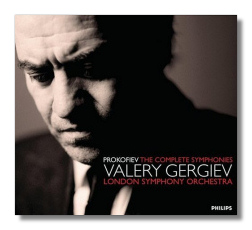
The Internet's Premier Classical Music Source
Related Links
- Prokofieff Reviews
- Latest Reviews
- More Reviews
-
By Composer
-
Collections
DVD & Blu-ray
Books
Concert Reviews
Articles/Interviews
Software
Audio
Search Amazon
Recommended Links
Site News
 CD Review
CD Review
Serge Prokofieff

Complete Symphonies
- Symphony #1 in D Major, Op. 25 "Classical"
- Symphony #2 in D minor, Op. 40
- Symphony #3 in C minor, Op. 44
- Symphony #4 in C Major, Op. 47 (original version)
- Symphony #4 in C Major, Op. 112 (revised version)
- Symphony #5 in B Flat Major, Op. 100
- Symphony #6 in E Flat minor, Op. 111
- Symphony #7 in C Sharp minor, Op. 131
London Symphony Orchestra/Valery Gergiev
Philips 4757657 4CDs: 50:56, 66:42, 64:54; 72:39
I used to think that Prokofieff's symphonies were uneven; some (Nos. 1, 5, 6, and 7) were a great deal better than others (Nos. 2, 3, and 4). Lately, I am starting to think – and Gergiev's new Prokofieff cycle just about proves it – that there are no weak links among the seven after all. It's just that Prokofieff changed styles so many times in the period between the First (1917) and the Seventh (1952) Symphonies, it is hard for listeners and for conductors to keep up and adapt.
The nicest thing about Gergiev's cycle is that it has given me a new appreciation for the Second, Third, and Fourth Symphonies without taking away anything from the other four. No set of Prokofieff's symphonies has been completely satisfying. Conductors are more successful in one symphony or another, depending on their affinity or their familiarity with the work; a history of live performances helps, obviously. Gergiev's cycle has unusual consistency. All seven symphonies were recorded live during the first eight days of May in 2004, in performances at London's Barbican Centre. While there is no applause, the audience's feeling of expectation and complicity can be sensed, and the electricity of the concerts resurfaces in these recordings.
Gergiev is as receptive to the music's childlike (and sometimes eerie) grace as he is to its grotesquerie and occasional violence. The Seventh Symphony, an under-performed masterpiece, sounds truly radiant here, like blue skies peaking out after the storm has just passed. Gergiev also emphasizes the balletic origins of the Fourth Symphony – and enterprisingly gives us not just the composer's original version, but also the significantly expanded version concocted in 1947. At the same time, he makes a hellish din -in the best sense of the phrase – out of the Third Symphony, whose material is based (in part) on Prokofieff's opera The Fiery Angel. Here, Gergiev and the London Symphony really cut loose, and I don't recall ever feeling the visceral impact of this symphony so strongly. When the bells ring out at the end of the symphony, you might jump out of your seat. (Kudos here to Philips's engineering team as well.) In the more familiar symphonies, I don't necessarily think that Gergiev surpasses Ormandy (in the Fifth and Sixth), or Schippers, Celibidache, and Koussevitzky (all in the Fifth), but it hardly can be said that these performances drag down the set. One feels the interpretive risk-taking involved in these recordings. Not all of the risks pay off, but enough do to make this Prokofieff cycle an exciting and rewarding listening experience.
The only thing I don't like about Gergiev's performances here is not his conducting, but his vocalism – something between grunting and singing – which has been captured well by Philips's sensitive microphones. On more than one occasion, I got out of my chair because I thought someone was leaving a message on my answering machine, only to discover that it was Gergiev's voice that I was hearing!
For my money, this is the best Prokofieff cycle on the market now, with the possible exception of Leinsdorf's (Testament), which is quite expensive and not remastered as vividly as I had hoped it would be.
Copyright © 2006, Raymond Tuttle




















